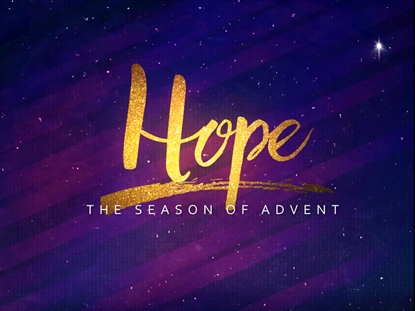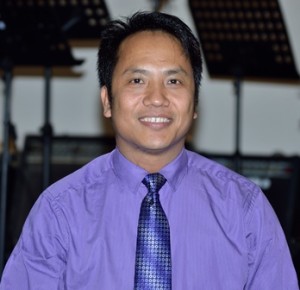
God is coming!
The announcement that “God is coming” weaves its way through the whole Bible. Adam and Eve heard it in the cool of the day when they hid themselves in shame and fear. The Hebrew slaves heard it in the midst of their cruel oppression in Egypt when Moses told them their Redeemer God was on his way to deliver them. The Israelites heard it again at Mount Sinai when God came down to make his gracious covenant with them and dwell among them despite their rebellion and sin. Israel, in her unfaithfulness and injustice, heard it from the mouths of the prophets as a warning of God’s judgment to come, “Prepare to meet your God!” (Amos 4:12). That judgment fell in the destruction of Jerusalem and the Babylonian exile. But then the exiles themselves heard it again as a beacon of hope: “Be strong, do not fear; your God will come . . . He will come to save you”; “. . . prepare the way for the LORD!” (Isaiah 35:4; 40:3).
Well, God did come and bring His people back from exile. But those words of the prophets resonated forward as a beacon of hope and longing for an even greater coming, when God Himself would come and walk among His people in living flesh and, in that divine humanity, bear the sin of the world on the cross for our redemption. So, through the readings that follow let us hear the voices of those, in the Bible itself, who anticipated, witnessed, and explained that first coming of the Lord Jesus Christ, and to hear them through the voices of Langham friends from around the globe today.
But the readings and reflections, like the Advent season, also call us to prepare for the day when, at Christ’s second coming, all of creation will rejoice to exclaim, “God is coming!” – coming to put things right forever.
May this work prepare you to share the joy of all creation and all the redeemed when He does.
ADVENT Week 1:
The Glory of the Lord According to God the Father: Finding hope in a dark world.
အဖခမည်းတော်၏အဆိုအရ သခင်ဘုရား၏ ဘုန်းတန်ခိုးတော်
2 Samuel 7 and Psalm 2
“Blessed are all who take refuge in him.” – Psalm 2:12b In some countries, such as the UK, Saudi Arabia, Thailand, and Brunei, people can understand what it means to be ruled by a king or queen, but people from most countries today find it challenging to appreciate the blessing of royalty and their rule. Despite its theological importance in Scripture, the kingship theme does not attract many preachers in Myanmar. Perhaps our memories are marred by unpopular colonial rule or the current despotic rulers. Another issue could be that most Christians come from ethnic minorities who once were ruled by local chiefs without the absolute power of a king. A concentration of power in one person sounds terrifying, so it is difficult to visualise a benevolent and just king. And yet, whatever our history or political system, we all long for someone with the power and the goodness to rule justly and set things to right.
The King Promised
Psalm 2 and 2 Samuel 7 both reveal longing for an ideal King. Most biblical scholars understand Psalms 2, 18, 20, 21, 45, 72, 89, 101, 110, 132 and 144 as royal psalms, show different aspects of the promised and longed-for Davidic King in ancient Israel and demonstrating the theological importance of the kingship theme. Psalm 2, specifically, is a poem for the awaited King’s coronation and a proclamation of His absolute authority. Because of its high hopes, it may have been used to enthrone the kings in ancient Israel, and it is one of the most quoted passages in the New Testament. The events explained in 2 Samuel 7 are understood by most scholars as the ‘theological summit’ of the Old Testament. David wanted to upgrade the portable tent shrine of the Lord to a permanent ‘house’ of cedar, an impressive temple. In response to his modest proposal, Yahweh announces that he will build a dynastic ‘house’ for David instead. King David appears to be sincerely uncomfortable living in a cedared palace while the Lord’s dwelling remains a skin-tent. David might have had another concern, as temple building for their gods was typical for kings of his time. However, the message of God through the prophet Nathan makes it clear that Yahweh was more interested in his presence dwelling in a human being’s faithful rule than in a magnificent building. Nathan, making a pun, declares that the “house” would be the dynasty of kings from David to his descendants “forever.”
The King Yet Awaited
Yet, Scripture also shows us that no king or ruler lives up to the ideal. The Bible does not hide the wickedness of humans, even of God’s chosen kings. In a strict sense, the Davidic kingdom ceased to exist after the death of Solomon (cf. 1 Kings 11:31–38). No Judahite monarch satisfied the hope of that ideal seed of David on the eternal throne. All kings have failed. Therefore, along with the psalmists, we must keep looking for the true Davidic King who will demonstrate the ideals presented in these texts.
The King Arrived
Who, then, is that ideal King? Who installs him? It is Yahweh who is enthroned in the heavens (Psalm 2:4) who has crowned his anointed (Mashiach in Hebrew or, in Greek, His christos) on Zion (Psalm 2:2, 6). This cosmic King, the Father, makes the nations his son’s inheritance and the end of the earth his possession (Psalm 2:7–8) and invites all kings and rulers of the earth to be wise by submitting (Psalm 2:10–11) because no rebellion or plot against Yahweh’s anointed will succeed (Psalm 2:1–3). This worldwide dominion stems from the cosmic King, not from the King’s earthly military victories. God, the Father, gives his Davidic son the right to rule forever (2 Samuel 7:13), promising the anointed that he will not withdraw his steadfast love (hesed) from him (2 Samuel 7:15). Nathan, the court chaplain, hails the new monarch, not just as the son of David, but actually as the son of God (2 Samuel 2:14).
In a world hoping for rulers that bring what we desire, our hopes are often dashed.
The New Testament writers reveal that all aspects of the messianic expectations are fulfilled in Jesus the Christ. Ultimately, the righteous and just ruler has arrived. Our hope is built into him.
Remember that God the Father glorifies his Son and demands complete allegiance to Him as the true King (Psalm 2:11; Luke 9:35). It will be wise and better for us all to be quick in taking refuge in Him.
BIO:
Rev. Dr. Ronald Laldinsuah
The Reverend Dr. Ronald Laldinsuah is a Langham Scholar who currently serves as the Academic Dean at Myanmar Evangelical Graduate School of Theology (MEGST) in Yangon, Myanmar.

